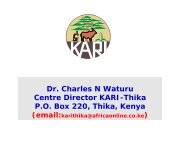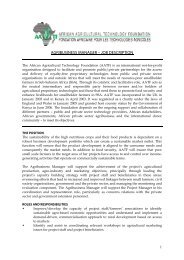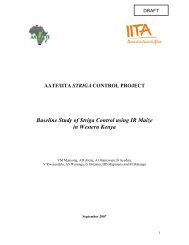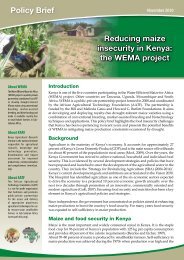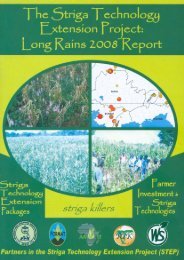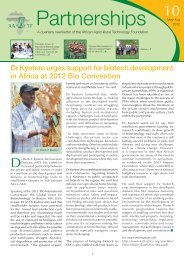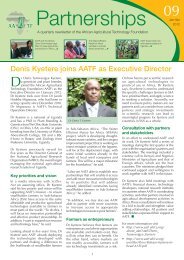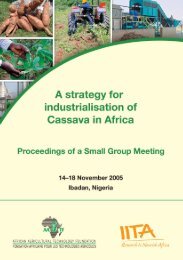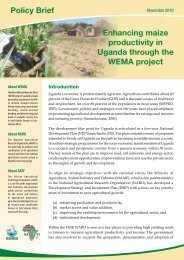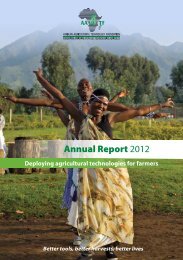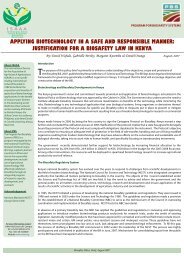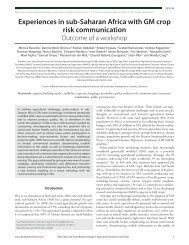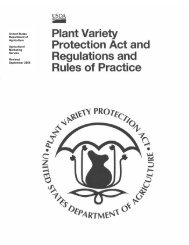AATF Inaugural Report - African Agricultural Technology Foundation
AATF Inaugural Report - African Agricultural Technology Foundation
AATF Inaugural Report - African Agricultural Technology Foundation
Create successful ePaper yourself
Turn your PDF publications into a flip-book with our unique Google optimized e-Paper software.
A New Bridge to Sustainable <strong>Agricultural</strong> Development in Africa<br />
Managing Intellectual Property (IP)<br />
to Benefit the Poor<br />
<strong>AATF</strong>’s work contributes to the development and<br />
delivery of improved technologies to resource-poor<br />
smallholder farmers. Partners in projects coordinated<br />
by the <strong>Foundation</strong> are committed to sharing<br />
and transferring technology and research products,<br />
both for research and for commercial use for the<br />
benefit of resource-poor farmers.<br />
<strong>AATF</strong>’s approach to managing intellectual<br />
property (IP) rests on the belief that developing<br />
countries in sub-Saharan Africa must make their<br />
own decisions about which agricultural technologies<br />
are appropriate. This includes whether or not to<br />
promote genetically modified organisms (GMOs).<br />
Such decisions have to be based on national or<br />
regional assessments of the costs, benefits and<br />
social acceptability of each technology. In the case<br />
of GMOs, <strong>AATF</strong>’s position is that the countries into<br />
which they are licensed must have the capacity to<br />
manage their safe development and use, through<br />
effective national biosafety regulations and other<br />
mechanisms.<br />
The <strong>Foundation</strong>’s IP policy ensures that knowledge<br />
and products resulting from <strong>AATF</strong> activities<br />
will be used for the maximum public benefit of<br />
resource-poor smallholder farmers in sub-Saharan<br />
Africa. Our policy stresses the responsible use of IP<br />
owned by others, in a manner that respects their<br />
rights. In the acquisition and management of thirdparty<br />
IP, we abide by all relevant international laws<br />
and treaties, as well as national laws in the countries<br />
in which <strong>AATF</strong> operates. Finally, <strong>AATF</strong> is guided by its<br />
core values of accessibility, accountability, credibility,<br />
dedication, transparency and trustworthiness.<br />
<strong>AATF</strong>’s Stewardship Role<br />
A number of private, public and civil society<br />
organisations have pledged to support the <strong>AATF</strong><br />
approach to technology transfer. It is imperative<br />
that the <strong>Foundation</strong> preserves the confidence of<br />
these stakeholders through effective leadership<br />
and responsible IP management.<br />
As a “responsible party,” <strong>AATF</strong> guarantees<br />
that proprietary technology is properly acquired<br />
and used. We start by conducting IP audits to<br />
identify any restraints associated with the use or<br />
distribution of products or processes incorporating<br />
specific proprietary technologies. We always<br />
endeavour to develop and deploy products that<br />
are “free and clear” of restrictions imposed by<br />
third-party IP rights. If not free and clear, we make<br />
every effort to reveal any restrictions that might<br />
apply and, where possible, obtain any required<br />
permissions.<br />
<strong>AATF</strong> strives to preserve the integrity of confidential<br />
information controlled by the IP rights of<br />
others. We include a confidentiality clause in all<br />
employment contracts and stress compliance with<br />
this clause as a condition of continued employment.<br />
We also strongly advocate that project<br />
partners require all personnel associated with<br />
our projects to sign confidentiality agreements.<br />
The <strong>Foundation</strong> routinely enters into non-disclosure<br />
agreements with collaborators, not only to<br />
facilitate the free exchange of information and<br />
materials, including IP, but also to preserve the<br />
integrity of confidential information at the institutional<br />
level.<br />
Responsible IP management requires that all<br />
ownership rights are defined at the start of any<br />
project. The ownership rights of <strong>AATF</strong> and those<br />
who provide technologies are negotiated on<br />
a project-by-project basis. Our policy is that IP<br />
rights should be shared equitably among project<br />
partners, taking into consideration: the original<br />
intellectual contributions of each; the specific kind<br />
and character of the IP, materials, research efforts,<br />
and preparatory work done by each collaborator in<br />
14



